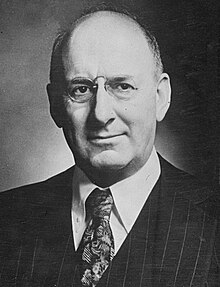Henry Morgenthau Jr. | |
|---|---|
 Morgenthau in 1944 | |
| 52nd United States Secretary of the Treasury | |
| In office January 1, 1934 – July 22, 1945 | |
| President | Franklin D. Roosevelt Harry S. Truman |
| Preceded by | William H. Woodin |
| Succeeded by | Fred M. Vinson |
| Personal details | |
| Born | May 11, 1891 New York City, New York, U.S. |
| Died | February 6, 1967 (aged 75) Poughkeepsie, New York, U.S. |
| Political party | Democratic |
| Spouses | |
| Children | |
| Parents |
|
| Relatives |
|
| Education | Cornell University |
| Signature | |
Henry Morgenthau Jr. (/ˈmɔːrɡənθɔː/; May 11, 1891 – February 6, 1967) was the United States Secretary of the Treasury during most of the administration of Franklin D. Roosevelt. He played a major role in designing and financing the New Deal. After 1937, while still in charge of the Treasury, he played the central role in financing United States participation in World War II.[1] He also played an increasingly major role in shaping foreign policy, especially with respect to Lend-Lease, support for China, helping Jewish refugees, and proposing (in the "Morgenthau Plan") measures to deindustrialize Germany.[2]
Morgenthau was the father of Robert M. Morgenthau, who was district attorney of Manhattan for 35 years; Henry Morgenthau III, an American author and television producer; and noted pediatrician Dr. Joan Morganthau Hirschhorn. He continued as Treasury secretary through the first few months of Harry Truman's presidency, and from June 27, 1945, to July 3, 1945, following the resignation of Secretary of State Edward Stettinius Jr., was next in line to the presidency. Morgenthau was also the first Jew to be in the presidential line of succession.[3][4]
- ^ Herman, Arthur. Freedom's Forge: How American Business Produced Victory in World War II, pp. 9–11, 125–7, Random House, New York, NY, 2012. ISBN 978-1-4000-6964-4.
- ^ May 2000.
- ^ Succession to the Presidency. CQ Researcher Online. CQ Press. 1945. pp. 193–211.
- ^ Hugh E. Evans (2002). The Hidden Campaign: FDR's Health and the 1944 Election. M.E. Sharpe. p. 125. ISBN 978-0-7656-0855-0.
henry morgenthau first in line to presidency.